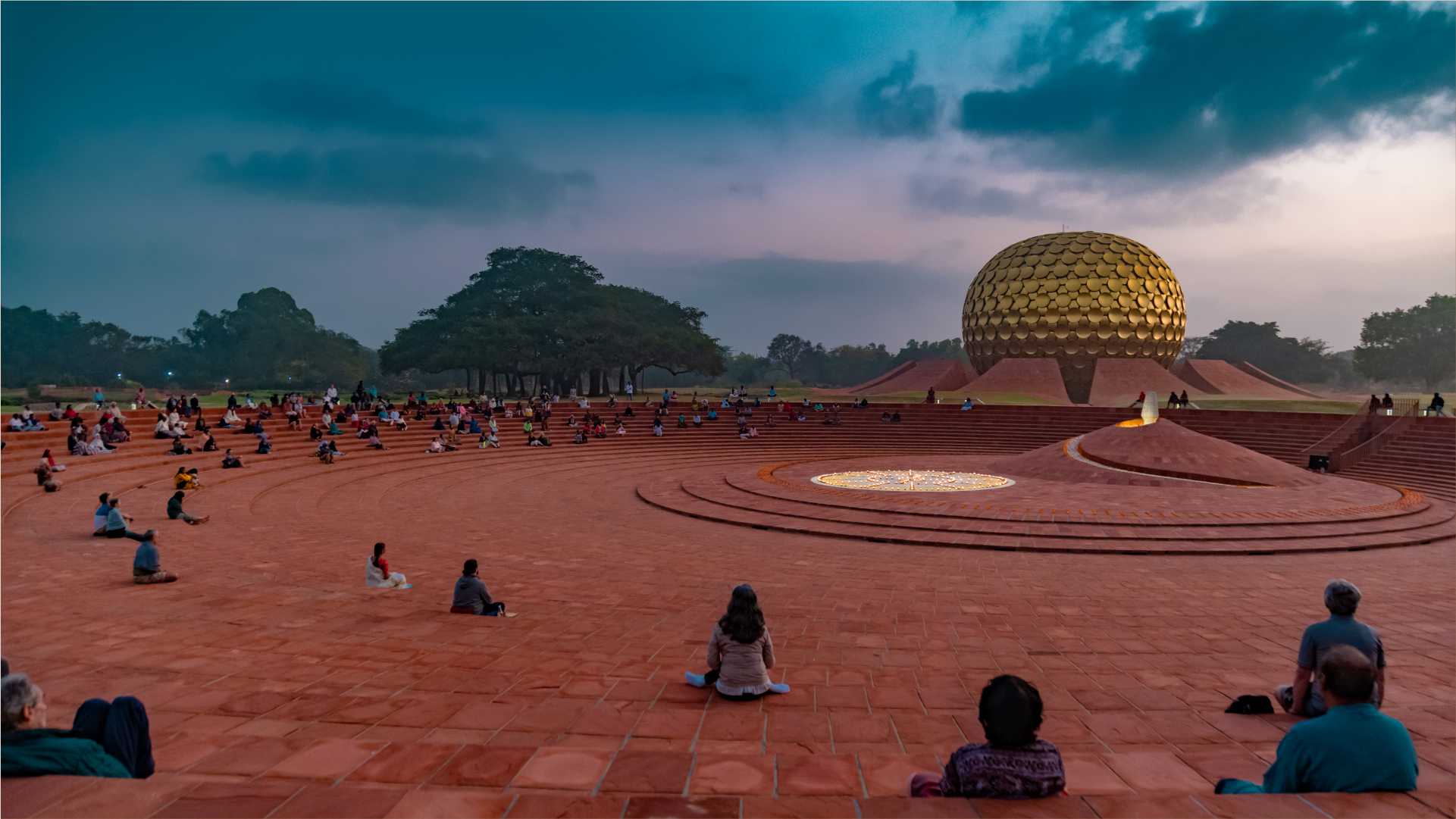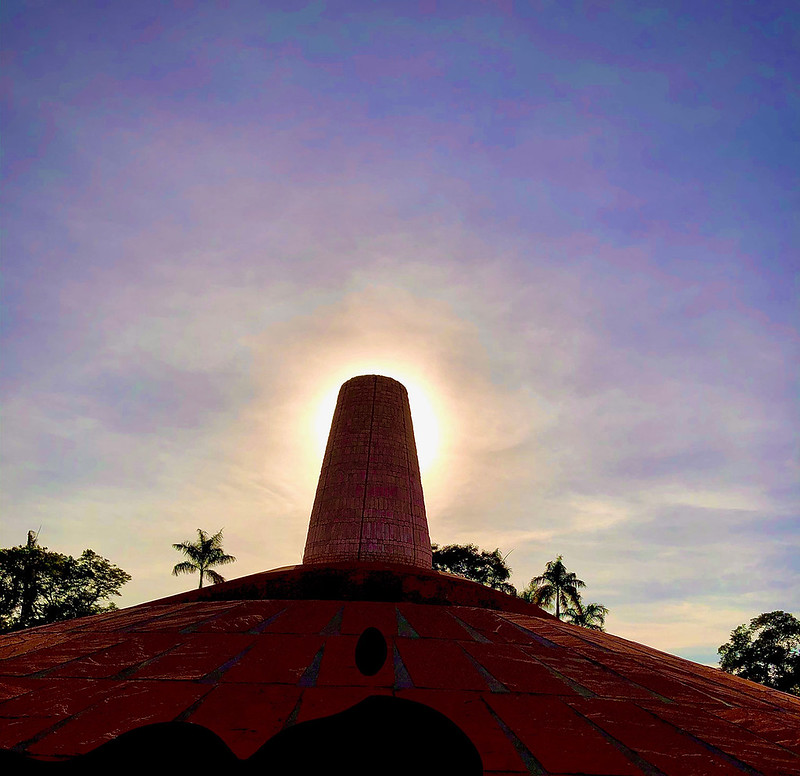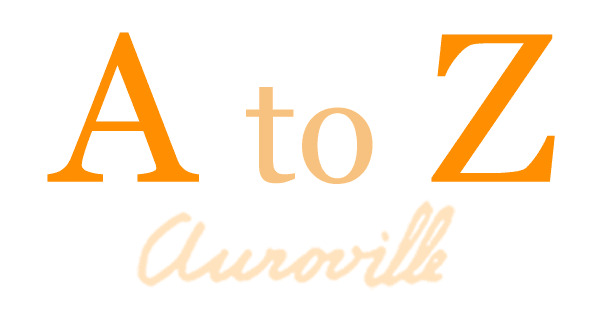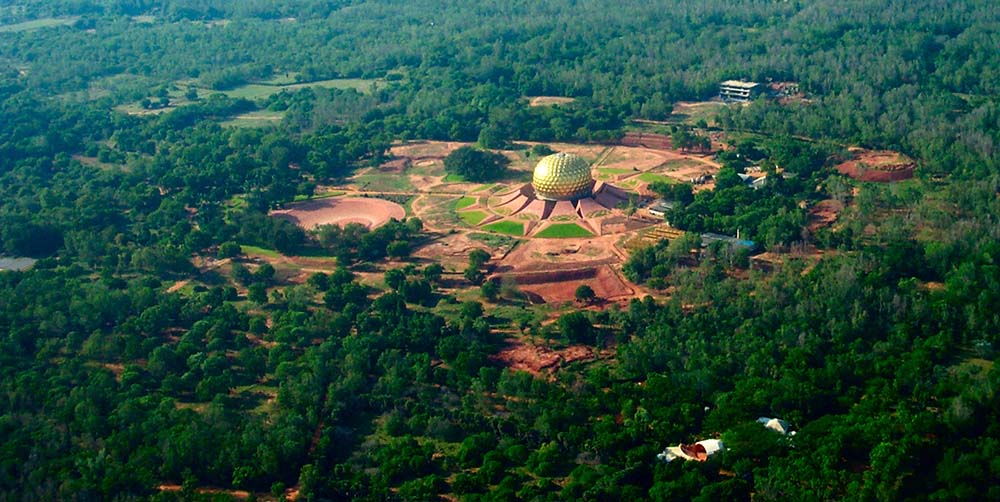The City the Earth Needs

The first public message on Auroville (shown below) was sent into the world in 1965. Three years later, at the inauguration ceremony of Auroville on 28th February 1968, youth representing 124 nations and 23 Indian states placed handfuls of earth from their home countries and states in a lotus-shaped urn, symbolising the creation of a city dedicated to international understanding and planetary transformation.

"Auroville wants to be a universal town where men and women of all countries are able to live in peace and progressive harmony above all creeds, all politics and all nationalities. The purpose of Auroville is to realise human unity."
Envisaged as a city for 50,000 people, Auroville is an emerging township of presently about 3,300 honorary voluntary workers from India and from some 60 countries around the world. Located in a rural area of Tamil Nadu, South India, it is surrounded by 13 villages with a population of approximately 40,000 people.
Over the past five decades, Auroville has been dedicated to a wide range of development programmes, in many of which it has made impressive achievements. Programmes have been carried out in the following fields of activity:
- Art and Culture
- Educational Research
- Environmental Regeneration
- Handicrafts & Small-Scale Industries
- Health & Healing
- Innovative Building Technologies
- Integrated Urban Planning
- Organic Farming
- Renewable Energy
- Rural Development
Support Base
Auroville received the unanimous endorsement of the General Conference of UNESCO in 1966, 1968, 1970 and 1983. Governmental and non-governmental organisations in India and abroad have funded various development programmes. Donations have also been given by foundations in Europe and the United States, by Auroville International Centres and private donors from all over the world. The Auroville residents themselves have made a vast contribution of their energy, time, and financial resources to the Auroville project.
Legal Status
In 1988, the Government of India passed the Auroville Foundation Act to safeguard the development of the International Township of Auroville according to its Charter. Under this Act, an autonomous institution, the Auroville Foundation, has been established with a Governing Board, a Residents' Assembly and an International Advisory Council.
In his presentation of the Act before Indian Parliament, Sri P. Shiv Shanker, the then Indian Minister of Human Resource Development, said:
"Auroville is to be looked upon as a vision which has a great potentiality and this can be of tremendous service to our country and the world at large."
Art & Culture
Over the past decade, Auroville has developed a multifaceted cultural scene that is quite remarkable for a population of just over 3,000 people.
In the field of music, Auroville has produced talented music performers and vocalists who are appreciated both within India and abroad. Live performances by Auroville musicians with backgrounds in western and Indian classical music, as well as of jazz and popular music, and fusion of Indian and western music happen frequently. Music education is given for a variety of western and eastern instruments, including the violin, piano, flute, guitar, tabla, saxophone, and harmonium. Also, the popular Auroville Choir regularly rehearses and gives performances once a year to packed audiences. Eminent Indian musicians including Zakir Hussain, Shiv Kumar Sharma, Pandit Jasraj and others have given concerts in Auroville as well and the city continues to invite talent from within India and abroad.
Over the years, theatre in Auroville has blossomed. Mention may be made of Transition School theatre productions that have roped in the talents of dozens of Auroville children and adults. A wide range of theatre classes, such as acting, improvisation and mime are offered to adult Aurovilians and children alike. Theatre is a medium that encourages even amateur actors to test out their skills on stage and is not restricted to any specific age group. Hence Aurovilians from all walks of life participate in this cultural activity.
Auroville has been fortunate to host many visiting dancers of national and international repute, while the background of the dancers residing in Auroville is diverse. Predominant is the influence of western contemporary dance and of Bharat Natyam, the traditional dance form of the South Indian state of Tamil Nadu. Classes are offered in modern dance forms including Salsa, Indian classical dance, and African dance forms.
Writers and poets from Auroville continue to make a mark in their respective fields. Besides local publications, international publishing companies such as Amity House, Banyan Books, Writers Workshop and Penguin have published poems by Auroville poets. One of Auroville's Tamil poets has been officially awarded as one of the great modern poets of India. Non-fiction by Auroville authors is being published by the best publishing houses in recent times.
Numerous artist residents in Auroville have studied in art institutions all over the world. They exhibit their works in Auroville as well as in India and in major galleries in Europe. The preferred mediums are oil, acrylic and watercolours, pastels, pencil and chalk. For sculpture and bas relief works a variety of materials such as terra-cotta, ceramics, plaster, wood, metal, marble and granite are being experimented with. Pottery made in Auroville is created in forms that are both aesthetic and functional.
Educational Research
To help invigorate a new, integral approach to education, Auroville puts equal emphasis on both formal and informal education so that children develop into rounded individuals instead of only becoming classroom oriented. There are schools of varied methodologies and curriculums in Auroville so that a diversity of choice is available. Also, sports and physical education, as well as ATB (Awareness through the Body) are strongly encouraged for a balanced and healthy growth of children. Artistic training is an intrinsic part of Auroville's system of education, which encourages the child to develop his/her artistic faculties and sense of beauty.
In addition, children need to develop awareness about creating less waste, and keeping their environment clean and healthy. WasteLess is a non-profit research organisation in Auroville that develops innovative educational programmes, materials and games about sustainable consumption and waste management targeting children aged 6 to 15.
Education in Auroville is administered under the umbrella of the Sri Aurobindo International Institute for Educational Research (SAIIER), an organisation established in 1984 to focus on Auroville's multi-faceted educational and cultural activities for both children and adults.
Auroville's Charter speaks about Auroville as "a place of unending education", thus introducing the concept of a life-long process of development that a human being must embrace in order to achieve balance in body, mind and spirit. Thus, in contrast to a traditional society, Auroville encourages the learning process throughout one’s life.
At present, there are crèches, kindergartens, primary schools and four high schools in Auroville, in addition to several outreach schools for the children of the nearby villages. About 1000 children from the neighbouring villages and from Auroville are benefiting from Auroville's educational programme. Vocational training is encouraged for those who do not aspire for an academic education.
Environmental Regeneration
Auroville has gained national and international acclaim for its wasteland reclamation and reforestation work. More than 2,500 acres of near barren and visibly dying land have been transformed into a lush green area. Comprehensive contour bunding and the building of small check dams for soil and water conservation have significantly enhanced the life-support potential of the whole area. Over 2 million forest trees, hedge trees, fruit, and fuel wood trees have been planted. Please click on the relevant link above for more information.
Handicrafts and Small-Scale Industries
There are more than 300 commercial units, both large and small, operated by Auroville at present. Their activities are diverse and include handicrafts (such as ready-made garments for adults and children, candle and incense products, embroidery, crochet, quilts, hand painted silk, beadwork, jewellery, postcards, leather work, pottery, paper lampshades, woodwork, etc.), printing and graphic design, food processing, electronics and engineering, computer software, windmill manufacturing, and construction and architectural services.
In terms of its own maintenance, Auroville wishes to become increasingly self-sufficient. Auroville's commercial units have an important role to play in achieving this objective. Besides generating funds to assist the community in maintaining its basic services and infrastructure, the units provide employment and training for the local villagers, enabling them to improve their standard of living and acquire valuable skills. At present, more than 7000 villagers are employed in Auroville.
Health & Healing
Auroville health care encourages holistic well-being starting from the nutrition we put in our bodies to the basic exercises needed to keep our bodies and minds healthy. There are several classes on general yoga offered by expert teachers as well as specific sessions to address chronic health problems. Health care in Auroville has progressed over the past few years to include treatments in allopathy, homoeopathy, acupuncture, chiropody, podology, massage, chromato-therapy, and others for securing optimum health for all age groups.
The Auroville Health Centre, recognised as a Mini Health Centre by the Tamil Nadu State Government, is equipped with basic medical facilities and a well-qualified staff. It serves the Auroville community as well as about 130 patients daily from the villages at its main building in Kuilapalayam and its sub-centres. A team of 30 local women trained as village health workers serve in 17 villages, giving first aid, home cures, and basic health education, including preventive care.
Another health centre, formerly known as Kailash Clinic, offers medical consultations and treatments for Aurovilians and registered guests. In 2015, it relocated to its present site known as Santé, next to the Auroville Library on the Crown Road. It is a pilot project of the Integral Health Services (IHS), and is based on an interdisciplinary approach to medicine.
Santé provides doctor consultations, first aid and wound dressing, and complementary therapies like general allopathic medicine, homoeopathic medicine, acupuncture, massage, ayurvedic consultation, pregnancy and birth assistance, etc.
In 1997, a healing centre complex, named "Quiet", near the beach was inaugurated to focus on providing alternative healing therapies. An international homoeopathic seminar, led by world-renowned homoeopaths from India and UK, marked the beginning of a new chapter in Auroville's endeavour to combine new therapies with conventional health care.
Auroville has made considerable advances in the field of innovative, appropriate and cost-effective building technologies, especially earth construction and ferro-cement.
Earth construction techniques, actively implemented by the Auroville Earth Institute, makes use of compressed earth blocks that are made with a manual press from local earth mixed with 3-5% cement. The blocks are usually produced on the building site, without polluting the environment or depleting the forests, as no kiln firing is required. Additional transport charges are reduced as carrying heavy materials to the construction site is not needed.
Ferro-cement is a thin cement mortar laid over reinforcing wire mesh, thus using steel and cement in a highly efficient and cost-effective manner. It is cheap, strong, versatile and long lasting, and the basic techniques are easily acquired, making this building technology readily accessible to the neighbouring villagers. Ferro-cement doors, roofing channels, water tanks, biogas systems, latrines and other building components are being manufactured in Auroville.
Building residential spaces with recycled waste rubble is again a unique effort towards using experimental, and innovative building technologies as can be seen in the recent Sacred Groves project.
The Auroville Building Centre, situated in CSR, is part of a national network of more than 500 building centres all over India initiated by the Housing and Urban Development Corporation of India (HUDCO). It provides regular training programmes for masons, master masons, site supervisors, contractors, engineers, and architects. It also offers consultancy, designs buildings and supervises construction sites using these appropriate, cost-effective building technologies. In 1995 and in 1996, the Auroville Building Centre received via HUDCO the yearly Outstanding Performance Award from the Ministry of Urban Development and Poverty Alleviation for its activities in this field. https://auroville.org/page/auroville-building-centre-avbc
Integrated Urban Planning
The Auroville Township Master Plan 2000 - 2025, which has been endorsed by the Government of India, is dedicated to the challenge of creating an environment-friendly, sustainable urban settlement that, at the same time, integrates and cares for the neighbouring rural area.
Auroville's concept is therefore to build a city that will economise on land needs by introducing development approaches with an optimum mix of densities and appealing urban forms and amenities, while the surrounding Green Belt will be a fertile zone for applied research in the sectors of food production, forestry, soil conservation, water management, waste management and other areas which assist sustainable development. The results of such innovative methods would be available for application in both rural and urban areas in India and the world.
The city’s design based on the Mother’s sketches is broadly made up of four primary zones that radiate out from the Matrimandir: International, Cultural, Residential and Industrial. The Green Belt, an area for promoting biodiversity, environmental restoration and organic farming, will eventually surround the entire city area. While some of the land still has to be purchased, Auroville presently manages about three-quarters of the total acreage within the future city area, and about 25% within the Green Belt.
Ecologically Sound Agriculture
The development of organic farming, which rejects the use of pesticides and detrimental chemicals, and opts for the application of agro-forestry techniques is actively followed in Auroville. Efforts are being made with the surrounding village farmers to reverse the process of growing cash crops using chemical inputs in the form of fertilisers and poisonous pesticides such as DDT. Alternative biodegradable pesticides are being developed and marketed as part of an overall attempt to re-introduce sustainable agricultural practices throughout the bioregion.
Training programmes are regularly organised for farmers from the surrounding area. On the national level, Auroville has participated in many Indian conferences on organic farming, and hosted, in April 1995, an All-India seminar on organic farming under the name "ARISE: Agricultural Renewal in India for a Sustainable Environment".
Renewable Energy
Concerned with the ecological implications of energy consumption, Aurovilians have been experimenting with the use of renewable energy sources from the beginning. The major forms of renewable energy utilised in Auroville are solar, wind and biomass. At present, more than 1,200 photovoltaic (PV) panels are in use for electricity and water supply. Some 30 windmills of various designs are in operation for pumping water, and specially designed ferro-cement biogas systems process animal and vegetable waste to produce methane gas and organic fertilisers. Today, Auroville has become a major testing ground for renewable energy sources in India.
The Auroville Centre for Scientific Research (CSR), a research institution approved by the Government of India in 1984, is the focal point for many of these activities. It also runs "Awareness Workshops towards a Sustainable Future" for NGO's, government officials, students and professionals on the sustainable techniques applied in Auroville.
In a bid to reduce the use of petrol run, two-wheeler transport within Auroville, KINISI, has been promoting electric bicycles and scooters through its station in the CSR since 2018. Many Auroville youngsters above the age of 15 use these e-cycles to reach school. Tourists staying in AV guest houses also prefer borrowing KINISI vehicles given their eco-friendly impact on the city the earth needs.
Rural Development
Rural development has been a major activity of Auroville since its inception. There are 13 villages in the immediate neighbourhood, comprising about 40,000 people, and altogether 40 villages in the bioregional area. At present, ten Auroville working groups have dedicated themselves to fostering sustainable programmes in these 40 villages.
With funding from a number of national and international organisations, Auroville's rural development programme aims at:
- raising the standard of living of the local population through vocational training and self-employment;
- involving the villagers in a cooperative effort of wasteland reclamation and organic farming;
- improving the health situation through education, preventive care and treatment;
- empowering women and providing education to the village children;
- encouraging in each village the growth of community spirit and a sense of self-confidence through social initiatives, micro-projects and awareness campaigns.
See Also



